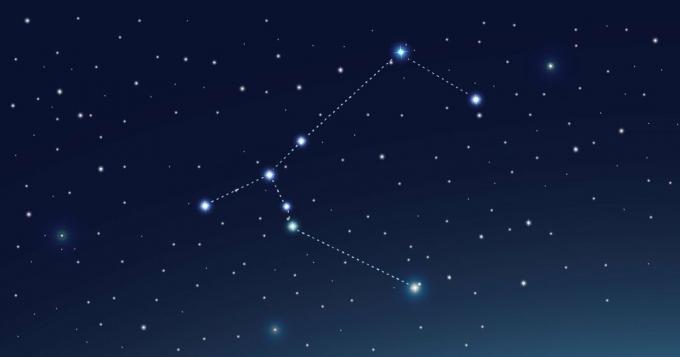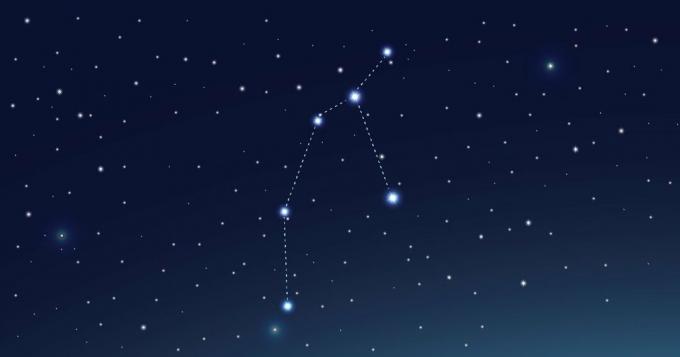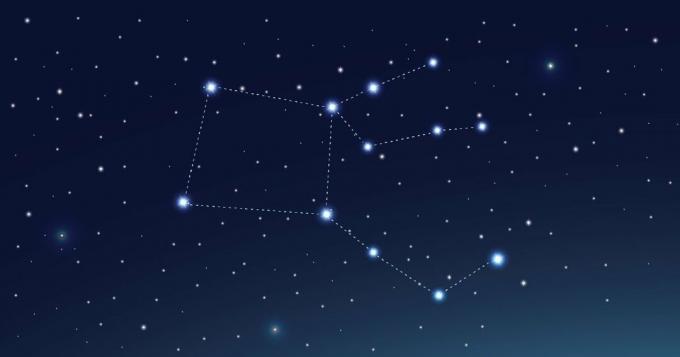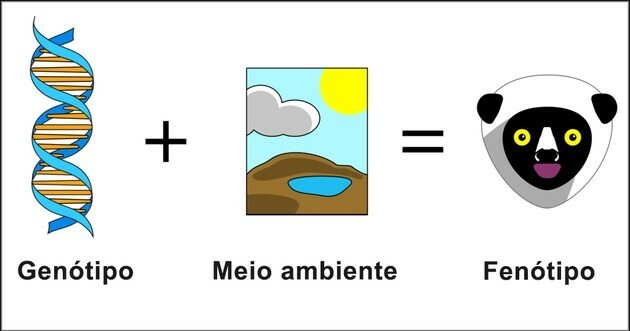The constellations are visible star patterns in the sky at night. are one human invention: the stars compose them have no relation to each other, they simply form a characteristic figure in the sky.
The origin of the constellations is quite ancient. Initially, they were used to explain myths and legends. Many constellations are even named after Greek gods.
They also played an important role for navigators, as they helped determine the location of ships and sailors.
Currently, constellations are used in astronomy studies, helping to identify areas of the sky. Altogether they are 88 constellations recognized by the International Astronomical Union (IAU).
most famous constellations
Orion

It is a visible constellation of the Southern Hemisphere, also called the constellation of the hunter, due to its shape. the famous Three Marys, a set of three stars that appear aligned in the night sky, are part of this constellation. Altogether, Orion has 81 stars.
Southern Cross

It is also a constellation visible only from the Southern Hemisphere and, therefore, is symbolic for several countries located in the global south, including the
Brazil. It is composed of 5 stars that form the shape of a cross.Big Dipper

It is the most famous constellation in the Northern Hemisphere, known for thousands of years and often cited in literary and cinematographic works. It consists of 7 stars.
Ursa Minor

It is a smaller version of Ursa Major, also with 7 stars. Among them is the Pole Star, fundamental for navigation in the northern part of the world.
Canis Major

Constellation visible from the Southern Hemisphere, it is close to the Constellation of Orion. It has the characteristic shape of a dog, and visualizing the two constellations, you have the hunter and his companion, dog. the famous star Sirius is part of this constellation.
Canis Minor

Like Canis Major, it is a constellation that makes up the figure of the hunter (Orion Constellation) and its dog companions, however this is a smaller constellation, with 2 stars, and better visible in the North hemisphere.
andromeda

Constellation visible from the Northern Hemisphere. It is named after the princess Andromeda, from Greek Mythology, wife of Perseus.
Perseus

Another constellation named after inspiration from Greek Mythology and can also be seen from the Northern Hemisphere. Its location, as seen from Earth, is close to the constellation of Andromeda.
pegasus

It is an ancient constellation, named by the Greeks based on their mythology. It can be seen from the Northern Hemisphere and has 4 main stars. It is also called Pegasus square.
Hercules

It is a boreal constellation, that is, it can be seen from the Northern Hemisphere. The constellation is named after one of the most important heroes of Greek Mythology.
Cassiopeia

It is also a northern constellation, named after Queen Cassiopeia, from Greek Mythology, mother of Princess Andromeda. It has 5 stars that form the characteristic "w".
Learn more about Greek gods.
types of constellations
- austral - are the visible constellations of the Southern Hemisphere;
- boreals - are visible constellations of the Northern Hemisphere;
- Equatorial - are the visible constellations close to the Equator Line, that is, that are in the "limits" between the Northern and Southern Hemispheres;
- zodiacal - are the constellations with a specific location in the sky, on the imaginary line called the ecliptic. This line represents the trajectory that the Sun makes in the sky, when seen from the Earth, during a year.
Constellations and the zodiac

Astrology is a practice that interprets the position of the stars (constellations, planets, among others) and their influence on people's lives and personalities.
According to the date of birth, a person is assigned a zodiac sign - which would determine their emotional and behavioral characteristics. They exist 12 zodiac signs and constellations referring to each of them.
The constellations and signs are: Aries, Taurus, Gemini, Cancer, Leo, Virgo, Libra, Scorpio, Sagittarius, Capricorn, Aquarius and Pisces.
These constellations are the so-called zodiacs, which are located in a strip of sky that, from an Earth perspective, the Sun appears to pass through during the year.
In addition to the 12 constellations of the signs, there is also the Ophiuchus Constellation (which does not correspond to a sign, but is in the same area of the Sun's trajectory), which is also considered zodiacal.
When astrologers say that the Sun is in a certain sign, it means that at that time of the year the Sun is "passing" through the constellation of that specific sign.
See also the difference between astronomy and astrology, what are stars It is shooting Stars.



